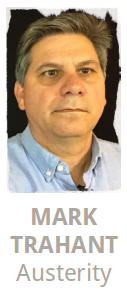
It’s easy to think about politics as being about elections. We concentrate so much of our attention, our money, and our energy on campaigns. But then what? Most politicians run because they want to change things. They want government to be effective, to use the machinery of state for We, the People.
Pull back the lens and look at the past eight years and Denise Juneau’s term as Montana’s Superintendent of Public Instruction. Yes, it was a big deal for her to get elected. She is the first, and only, American Indian woman to hold a state constitutional office (such as governor or attorney general). But then what?
“I have had a great time being Superintendent of Public Instruction. Eight years of working with communities across this state on Graduation Matters Montana, on Schools of Promise, on Farm to School, we could run down a whole litany of different topics,” Juneau said last week at the Montana Budget and Policy Center’s Legislative Summit. “There is really a lot to be proud of.”
In what Juneau said was her last public speech as Montana’s school superintendent she credited the work of Montana Budget and Policy Center and other community groups that worked together to bring about change. Take Graduation Matters Montana.
“When I first stepped into office, drop out rates were too high, way too many students were dropping out of school, and we used data, and we talked about information, we talked about reasons,” Juneau said. “The information you can then use to advocate for change. That change has actually resulted in 58 communities across this state pulling people together at a community level to get things done.”
The result: Raising Montana’s graduation rates to historic highs for two years in a row. And, at the same time, raising academic standards in English, math, science, arts, and health, so that that a high school diploma is more valuable.
Another successful effort was the Schools of Promise program in Montana’s tribal communities. That program, which began shortly after Juneau took office in 2009, were grants targeted to reservation communities and “struggling schools.” That program invested state resources, including an unprecedented 22 employees, so that the schools could get grants to improve everything from teaching to school leadership.
“I have learned from this position that being an advocate is so important, being able to use the position that you have, to talk to people about the important things that need to happen,” Juneau said. “I have just had a blast being the top advocate for public education for the last eight years and I could not be more proud of the work that happened.”
Juneau also talked about her recent bid for Congress. She joins a remarkable group of Native American women who have run for that office, including: Jeanne Givens in Idaho, Diane Benson in Alaska, Ada Deer in Wisconsin, Kalyn Free in Oklahoma, and in Arizona, Wenona Benally, Mary Kim Titla and Victoria Steele. I reject the word, “unsuccessful.” It’s true that none of these candidates were elected. Yet. And every campaign, every challenge, only pushes the door open a bit wider. So: One day, soon.
“I am sad that I lost, but I do not feel bad about our campaign because we ran a damn good campaign,” Juneau said. “We raised more money than any Democrat that’s ever been in this race, we had good ads, we had great advocates out in the community, we had organizations helping us, we did everything we were supposed to do. We just lost. Those are bitter pills to swallow, but sometimes that’s what happens.” (Previous: Juneau for president?)
She said it doesn’t mean you get out of the game. “You stay in there and find other avenues to fight in and you make sure you are always, continually pushing what is in your heart and what is in your mind that you know is right,” she said. “Because if we don’t, nobody else will.”
And who knows what door will open next? “I am looking forward to doors opening, figuring out if I want to take advantage of that and bringing people with me,” Juneau said. “That’s what this game is about.”
Mark Trahant is the Charles R. Johnson Endowed Professor of Journalism at the University of North Dakota. He is an independent journalist and a member of The Shoshone-Bannock Tribes. On Twitter @TrahantReports
